Scouse
I’ve mentioned the political angle of the 80s British invasion into U.S. comics, in Looking for a hero. This was most relevant to me regarding John Constantine in Jamie Delano’s Hellblazer, in which he definitely became his own thing relative to his original appearances in Swamp Thing. The topics exploded on me as I wrote, so this is the set-up, to talk about a specific zone of British politics and pop culture, and its relation to the U.S., and how it shifted from Moore’s treatment to Delano’s.
Permit me to introduce to you Margaret “Maggie” Thatcher, who as far as I’m concerned is accurately depicted in the leading image, which is from the cover of Hellblazer #3. My life had touched this more directly than I’d realized. Just following high school graduation in 1983, I was in a production of Godspell which toured England in 1983, and one of the families we stayed with was hard-line Labour – and I watched the June 9 UK General Election returns with them. The Tories’ first term had been a disaster: rotten collapsing economy, social breakdown, turning Scotland into a slum and Ireland into a firestorm, everything. But Post-Falklands, likely the most penny-ante bullshit military action in history, the Tories swept the country (see Wikipedia if you don’t know much about it).
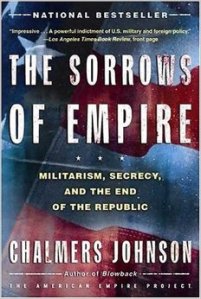 This is a huge moment, for which you really need to read Chalmers Johnson. The U.S. was a decade into the creation of the World Bank and the International Monetary Fund, and now adjusted to fiat currency. This had two effects: the crippling Vietnam war debt could now be ignored, and any nation that accepted IMF loans was now effectively a U.S. colony. Trapped in trying to use actual money, the USSR’s days were numbered, although no one really grasped that yet (nor has anyone, for the most part). The question was whether other nations, especially those with National Security Council clout, were going to get on board as official U.S. satraps, especially France, which had always kicked in the Cold War traces; Britain, which had gone suspiciously Swedish during the 60s; and Germany, completely at sea after that Berliner Willy Brandt upset the comfortable apple-cart. Maggie led the way, thus taking credit for “recovery” better known as cloaked international subsidy, to be followed by the others by the mid-80s.
This is a huge moment, for which you really need to read Chalmers Johnson. The U.S. was a decade into the creation of the World Bank and the International Monetary Fund, and now adjusted to fiat currency. This had two effects: the crippling Vietnam war debt could now be ignored, and any nation that accepted IMF loans was now effectively a U.S. colony. Trapped in trying to use actual money, the USSR’s days were numbered, although no one really grasped that yet (nor has anyone, for the most part). The question was whether other nations, especially those with National Security Council clout, were going to get on board as official U.S. satraps, especially France, which had always kicked in the Cold War traces; Britain, which had gone suspiciously Swedish during the 60s; and Germany, completely at sea after that Berliner Willy Brandt upset the comfortable apple-cart. Maggie led the way, thus taking credit for “recovery” better known as cloaked international subsidy, to be followed by the others by the mid-80s.
To talk about Constantine in this context, I need to start with his beginning. This fellow may or may not be him, and if he is, might be a bit of a first-pass image, “let’s get this punky English guy in there.”
Aw right then, needs a bit more chat to get him right. Something more like …? It’s no secret that the Constantine with a name and dialogue had a direct cinematic reference to work from.
The film Quadrophenia needs unpacking. It was released in 1981, based on a 1973 concept album, which was itself about events and subcultures from the early 1960s. Its role here is nothing to do with actual mods from the original period or even with The Who in the early 70s, but with the ~1980 New Wave: the career-transfer of many English pop groups to the U.S. Although that’s an ongoing thing and always has been, in this case it had acquired punk and reggae along the way to mix with the usual R&B, and it also featured a deliberate musical shift from Clapton, Page, et al. Back home it was more continuous, in that these groups had cut their teeth in the genuinely brutal British music-hall scene as it always had been, and were pretty much contemporary with the more familiar rock acts of the 70s, but were perceived in the States as very new and, profitably although inaccurately, very 80s. You know them well: The English Beat, The Police, what is it with Brit bands and “The,” The The (see?), Midnight Oil (from Australia), New Order … there were American roots too, including The Knack. Purists say “real” New Wave was only 1978-1981, and that MTV and The Buggles “ruined” it, but that’s not what hairstyles and fashions across the nation indicated. MTV New Wave with its appropriated punk trappings was the Eighties.
Here’s some tricky stuff regarding punk which few Americans ever ever understood, as most completely confounded it with New Wave; after all, they encounterered them together along with the similarly-older reggae. I’m just going ahead to assume you’ve read Subculture: The Meaning of Style, which as far as I’m concerned is the only sociological text worth reading. So you know about disgruntled working-class adoption of marginalized groups’ symbols, how these symbols and a variety of defiant techniques (garbage as jewelry, e.g.) become first a real separatist thing … and then, when picked up as edgy by dissenting but still middle-class youth culture, shift inexorably into fashion. For jazz, this took decades. For rock, about ten years. For punk and hip-hop, it was blurringly fast. (Hebdidge does a wonderful job with punk, especially relative to glam, as could be written only by someone who was right in the thick of it.)
Going to the Quadrophenia film again, the mods in it are picture-perfect 1980 Punk/New Wave as perceived by the new audience. Consider the black presence among them in the film, who would certainly not have been included by them in the period it references, and the rockers who look like 70s bikers, nothing like the Brylcreem greasers they were. All my little middle-class New Wave and/or punk buddies squee’d over the movie and rightly so; that was them on the screen, the New music, showing those KISS and Journey assholes what-for. (You may have wondered how such a defining and uncompromising hard-rock band such as The Who was somehow mod instead of rocker, if the gangs were really as depicted in the film, and I call attention both to the embrace of the band by the fashionable version of punk and to this very moment of Daltrey’s significant haircut.) (One confusing detail is that mid-80s New Wavers immediately adopted styles from the film, so saying they look alike can be misleading.)
And crucially, the mod leader resembles no mod who walked the face of the earth, displaying instead key features of the punk … but not quite. He’s the next-stage, the punk aesthetic as translated into the New Wave, with Sting’s presence being so perfect because it defined the role, rather than the other way around. (We’ll just forget the eventual revelation concerning this character in the story, which as far as the audience was concerned was off-message and instantly ignored. Punk’s working-class and sometimes thuggish origins, more consistent with the rockers of the film than the mods, did not cross the water as far as the demographic I’m talking about is concerned.)
So, back to Constantine, who I suppose back then, as a complete mystery man, might be taken to a literalist extreme as being from Brighton if you go by the movie, or North Tyneside if you go by Gordon Sumner the person. But no – as the character moved into Delano’s hands, the regional English backstory snapped into a very different place, which is what I really want to talk about.
Scouse (rhymes with “house”) is a word I learned from Hellblazer and immediately took pains to investigate, partly due to personal fanwank and very much due to my political engagement with that title. My girlfriend of the time was of Indian descent, had been born in England, and had come to the States as a pre-teen; she knew all about this stuff and helped me out, which is good because then, the only Brit accent any American person could do was “Monty Python.” The term, also “scouser,” indicates a person from Liverpool and the associated accent. Now this was confusing too, as the only thing I knew about Liverpool was “Liverpudlian” which meant Beatles, so I had to learn a little more.
First, though, the accent:
Ha, you thought Constantine sounded like Hugh Grant or some shit, didn’t you!
Here’s the real thing: we’re talking hard-core working class without roots in the Norman land-ownership system, a city which owes its commerce, demographics, and identity to international commerce rather than to London’s patronage, and in which political defiance, the oldest of old-school Left, and shameless snark contribute to British Labour Party without taking marching orders from it. In the 60s and 70s, this is not swaying and singing “We Shall Overcome,” it’s barricades and bricks. Whether today’s scouser feels or even knows anything about this, I have no idea, but this was thirty years ago in Maggie’s England, and the collective hate leveled at her government from Liverpool was probably audible.
In this context, the U.S., late-80s chasm between punks and hippies was simply not present. The first issue of Hellblazer was blatantly clear, both in story and in accompanying text: counterculture and subculture, in Hebdidge’s absolutely technical terms, were one solid blend. Delano’s Constantine was a protest-music event organizer in the mid-70s, and evidently right there with the Pistols, even with his own DIY label called ‘Snot Music.
Now I’ll be the first to say that Delano’s treatment of any and all of this was ham-handed and cringe-inducing, all the more so for me, likely in the top ten most Tory-despising, Reagan-loathing members of my age group in the U.S., gnawing his entrails over every single facet of the 80s every day. The first two issues are absolute gold and a direct contributor to my own work, but after that, ouch. The demon yuppies story, the lecture-on-Vietnam, the messiah cult stuff, the nuclear holocaust nightmare, all shot through with the unreadable third-rate haiku captions … it’s horrible, not even a footnote to the previous decades’ content in Last Gasp or the Eclipse and Epic titles.
Its best moment comes a couple of years later, in the Dangerous Habits story, when Constantine, dying of cancer and caught among demonic intrigues, visits the Parliament building to glare at it. Is this a story about God and Man, Evil and Fate? Fuck no. “It’s always been you, mate,” he growls. Imagine it in the scouser sound. That’s when he decides not to give up, not to collapse under the weight of his disease and of the very cosmos. Because he’s not going to stop throwing rocks at Parliament, not if there’s even the tiniest bit he has to say about it. This isn’t “liberal,” not a bit of the later Blair Labour which is nothing but Tory-lite. This is commie stuff, tits out.
So you know, what I really want to write about is the Fear Machine story from 1988-1989, and the uneasy, fracture-filled, but more connected than you think, relationship among punk, Leftyness, hippies, and New Age paganism. It also involves a whole lot of me and sex. But this Commie John Constantine issue is really important to settle first, so let’s focus there.
Links: Scouse: a class accent, Hellblazed reading, A history of mods and rockers
Next: Whoa-oh-oh na na, whoa-oh-oh na na
Posted on July 26, 2015, in Politics dammit, The 80s me and tagged Alan Moore, Dangerous Habits, Dick Hebdidge, Fear Machine, Hellblazer, Jamie Delano, John Constantine, Liverpool, Margaret Thatcher, Mods, New Wave, punk, Quadrophenia 1973 album, Quadrophenia 1981 film, scouse, Sting, Subculture: The Meaning of Style, Swamp Thing. Bookmark the permalink. 7 Comments.
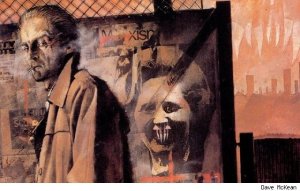
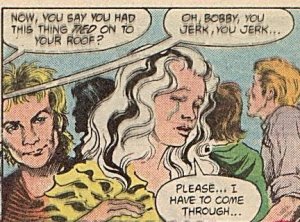

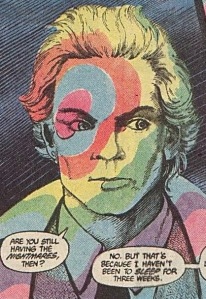
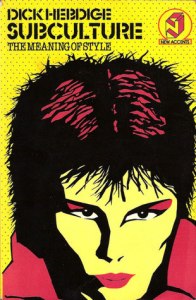

Damn, Ron – just damn. I thought one day, I could say “yeah, you know all about that California stuff, but let me tell you about how British Punk/New Wave slammed into East Coast America. The real deal, maybe 75-85, not that late 80’s faux-thing. Ya see …”
Of course, you’re already there. With an apparently kick-ass book I’d NOT heard of. I suspect you’d have no trouble understanding the South Boston guy I worked the lumberyard with, for whom The Clash and Bruce Springsteen were equivalent idols (he mystified me, at first). So much for my friendship with real British girls who could explain to me it’s simply “The Beat” – the ENGLISH Beat is stupidamericans. And The Specials are more politically relevant anyway. Or The Clash (again, The Clash!). And oh, so many things. Punk/New Wave hitting white middle class and working class, Liverpool international commerce (why I even had those wonderful British girl friends), the hippie/pagan stuff, basically ALL the stuff you mention, add meeting odd American-wannabe IRA, British-wannabe Reaganites (Thatcher was flawed, but REAGAN …) Ah, hell, you’re in my lived experience. I didn’t read Constantine and I’m still excited by what comes next in this discussion.
For Liverpool (like western Scotland), Americans would be better-off thinking Irish or even Scandinavian than our usual posh-English associations (I mean that’s wrong too, and probably wrong place, wrong historical period you could get killed for saying it. But for Americans, now – better). I suppose I shouldn’t, but just based on the panels linked, and given how clued-in I find the politics/time period stuff – I say, Trust Ron here. Constantine, the working class commie. Sure. (Now get on with it!)
LikeLiked by 1 person
On the odd chance anyone’s confused – it should be American wannabe-IRA, British wannabe-Reaganites. It’s not the nationality that’s off, it’s the … aspiration. Gack.
LikeLike
That was a useful clarification! My mental image of an IRA guy who wanted to be a successful Reaganite was … interesting, but it’s a relief to spare those brain cells from continuing to work on it.
LikeLike
For what it’s worth, this Brit thinks you’ve got it on understanding Thatcher and the 1980s mood. It’s fascinating to me that you’ve got to this by *studying* it rather than (as I have) living in that culture. This gives me hope for various bits of writing I’m doing.
I agree as well as the clumsiness of Hellblazer as social commentary. I only tried reading Hellblazer recently, and was disappointed; I was expecting much more. The ideas and what I’d heard about Hellblazer were so much better than the execution.
I liked the recent Constantine TV series quite a bit though, and it showed signs of getting better as it went on, even if it didn’t have any of the British 1980s mood.
LikeLike
Thanks Paul! What you see is pretty much at the limits of my knowledge though. I knew English exchange students at my high school which helped a little, and there was that tour in 1983, and my girlfriend in 1988-89. The other knowledge sources are even more piecemeal and scattered.
LikeLike
Pingback: The orgasm that saved the world | Doctor Xaos comics madness
Pingback: Two villains | Comics Madness